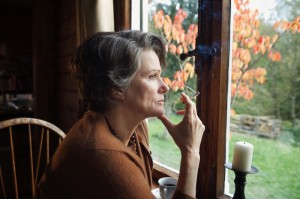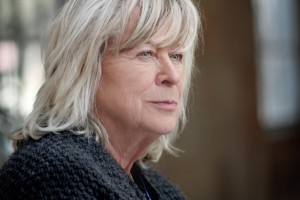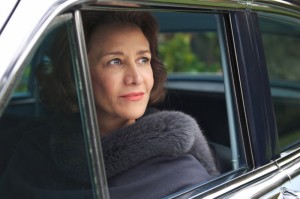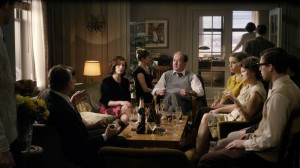“Hannah Arendt” is a biographical film about German-Jewish philosopher and political theorist. Jeanne has her take.

“Hannah Arendt”
Cast:
Hannah Arendt: BARBARA SUKOWA
Heinrich Blücher: AXEL MILBERG
Mary McCarthy: JANET MCTEER
Lotte Köhler: JULIA JENTSCH
Hans Jonas: ULRICH NOETHEN
Kurt Blumenfeld: MICHAEL DEGEN
Director: MARGARETHE VON TROTTA
Screenwriters: PAMELA KATZ & MARGARETHE VON TROTTA
Cinematographer: CAROLINE CHAMPETIER
Editor: BETTINA BÖHLER
Producers: BETTINA BROKEMPER, JOHANNES REXIN
Co-Producers: BADY MINCK, ALEXANDER DUMREICHER-IVANCEANU, ANTOINE DE CLEMONT-TONERRE, DAVID SILBER
Studio Synopsis:
The sublime Barbara Sukowa reteams with director Margarethe von Trotta (Vision, Rosa Luxemburg) for her brilliant new biopic of influential German-Jewish philosopher and political theorist Hannah Arendt. Arendt’s reporting on the 1961 trial of ex-Nazi Adolf Eichmann in The New Yorker—controversial both for her portrayal of Eichmann and the Jewish councils—introduced her now-famous concept of the “Banality of Evil.” Using footage from the actual Eichmann trial and weaving a narrative that spans three countries, von Trotta beautifully turns the often invisible passion for thought into immersive, dramatic cinema. An Official Selection at the Toronto International and New York Jewish Film Festivals, Hannah Arendt also co-stars Klaus Pohl as philosopher Martin Heidegger, Nicolas Woodeson as New Yorker editor William Shawn, and two-time Oscar Nominee Janet McTeer (Albert Nobbs) as novelist Mary McCarthy

Jeanne’s Take:
HANNAH ARENDT is a major film event at a time when both human rights and the concept of clear thinking are being marginalized.
Margarethe von Trotta was a pioneer of the New German Cinema movement, which began in the 1960s. She pursued a successful and acclaimed acting career in films directed by Rainer Werner Fassbinder and Volker Schlondorff, before turning to directing. She is not afraid of tackling complex subjects or strong heroines. Among the films she has directed are “Vision” in 2009 about Hildegard von Bingen and “Rosa Luxemberg” in 1986. She co-directed “The Lost Honor of Katharina Blum” in 1975 (from the novel by Nobel laureate Heinrich Boll). And she has worked with the distinguished actor Barbara Sukowa in the Rosa Luxemburg picture and other films.
Von Trotta has teamed with Sukowa again for a fascinating new film, HANNAH ARENDT, that was an official selection for the Toronto International Film Festival and the New York Jewish Film Festival. The director has cast Sukowa as Arendt, Janet McTeer as American novelist Mary McCarthy, Klaus Pohl as renowned philosopher Martin Heidegger, and Axel Milberg as Arendt’s second husband Heinrich Blucher. Friederike Becht is Hannah Arendt as a lovely young college student meeting Heidegger for the first time, and Nicholas Woodeson is New Yorker editor William Shawn.
Hannah Arendt (1906-1975) was one of the most influential political philosophers of the 20th century. She studied under Karl Jaspers and Martin Heidegger. She completed her Ph.D. at the University of Heidelberg, after writing a dissertation on Saint Augustine. Escaping the Third Reich just before World War II, she lived in a detention camp in France, which became a dangerous place after France surrendered to Germany. Arendt and her second husband fled to the U.S., where she became an American citizen in 1951. An intellectual who taught at several universities here, Arendt became known for books such as The Origins of Totalitarianism and The Human Condition. However, her coverage of the Adolph Eichmann trial for New Yorker magazine is what brought her fame, and for a time infamy.
This short but mesmerizing film covers about four years 1960-1964, from the time of the Eichmann trial in Jerusalem through the publication of her articles in the New Yorker to the publication of her book on the trial and the nature of evil.

This film is both brave and brilliant. Many would have preferred that it not be made. Yet Arendt’s courage in covering the controversial Eichmann trial and in writing about what she experienced requires us to remember why she did it, why she struggled to understand the excesses of that particular sector of the Second World War.
Sukowa’s portrayal gives us a brilliant woman and independent thinker living a life seemingly fulfilled, surrounded by an admiring husband and loyal friends. She teaches, she laughs and interacts with friends, she paces and smokes cigarettes continually, and she reads. And thinks. And writes.
“Everything’s simple for a genius,” Hannah’s friend Hans teases her. But from the moment the New York Times announces that the Mossad secret police have kidnapped Eichmann in Buenos Aires and smuggled him into Jerusalem for a trial on war crimes, nothing is simple.
As the German Jewish intellectuals in Hannah Arendt’s living room speak in German about the upcoming trial, while Mary McCarthy complains that they need to speak English so she can understand, emotions pour out: questions about the legality of the trial, and Ben Gurion’s true intentions in holding the trial, and whether Hannah is descending into hell itself by agreeing to travel to Jerusalem as a journalist, and her husband’s concerns about whether this experience will send her back into the “dark times.”
Arendt has questions as she covers the gut-wrenching testimony about the death camps. Who is this wild predator displayed in a glass cage (Eichmann)? Is that cage really necessary? Over coffee, avid followers of the trial speak of the 16th century poet Torquato Tasso and of Goethe’s Faust. “Eichmann is no Mephisto,” Hannah says. She is gently warned not to disappoint, to come down on the right side of this momentous event. And this will not be the last warning.
So many stunning moments portrayed with clarity and respect in the film, HANNAH ARENDT. The depth and complexity of her friendships in the U.S. and in Jerusalem. Actual footage of the trial, courtesy of American television technology of the 1960s. Arendt’s deeply felt joy as she looks at the Jerusalem skyline, embracing one of her dearest male friends. Listening to testimony in the courtroom, and then in the pressroom (where she can smoke), and pouring over the printed transcripts, there is her dawning awareness that evil, the concept of evil, may be other than what she had assumed. No one in her circle wants to hear that, no one at all.
Back in New York, she practically lived in her study, pouring over documents and ignoring the frantic calls of her editor – where are the articles? When will you finish writing? Her husband Heinrich, her friend Mary McCarthy and her loyal assistant Lotte protected her from the outside world as she wrestled with what she had seen and experienced in Jerusalem.
Arendt completed the 300 page article finally and tossed it on her husband’s desk. “There, it is finished.” The New Yorker published it in five installments, prior to the publication of the book, Eichmann in Jerusalem. And then the nightmare began. Public anticipation followed by rage from certain sectors, hate mail, academic recrimination and pressure to resign, and the anger of two dear friends who would no longer speak to her.

Most shocking for me was the invasion of her suburban space, where she was alone and unprotected, by Mossad, an alien secret police force. They dared to threaten an American citizen on American soil in the 1960s! And they promised to ban her book. But of course, their power has grown exponentially since then….
Today this remarkable woman’s ground-breaking books are required reading in colleges and universities. For more insight into Hannah Arendt, I recommend her letters. There was a time when people wrote long letters on manual typewriters and we are privileged to have access to them:
[1] Hannah Arendt and Karl Jaspers: Correspondence 1926-1969;[2] Correspondence of Hannah Arendt and Mary McCarthy, 1949-1975;
[3] Hannah Arendt and Heinrich Blucher: Correspondence, 1936-1968;
[4] Letters 1925-1975: Hannah Arendt and Martin Heidegger.
And I most especially recommend this nuanced film with its authentic performances. I sat next to a friend as I watched this film; she had grown up in a German Jewish household and found the film to be as powerful as I did.
You come away from HANNAH ARENDT awed by the fact that this was no history lesson in a classroom. Arendt lived this life, lived through these events, and had a fundamental reason for wanting to understand the nature of evil.
“The trouble with Eichmann was precisely that so many were like him, and that the many were neither perverted nor sadistic, that they were, and still are, terribly and terrifyingly normal. From the viewpoint of our legal institutions and of our moral standards of judgment, this normality was much more terrifying than all the atrocities put together.”
– Hannah Arendt
